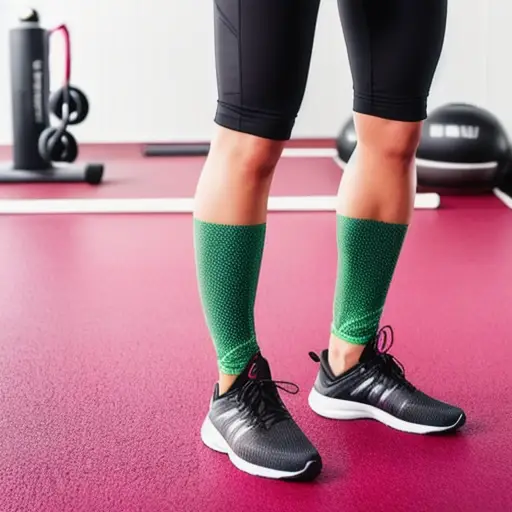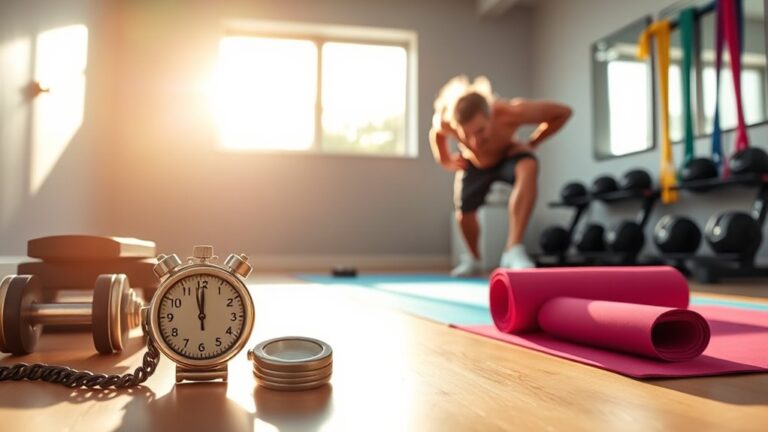How Alcohol Affects Your Gym Performance
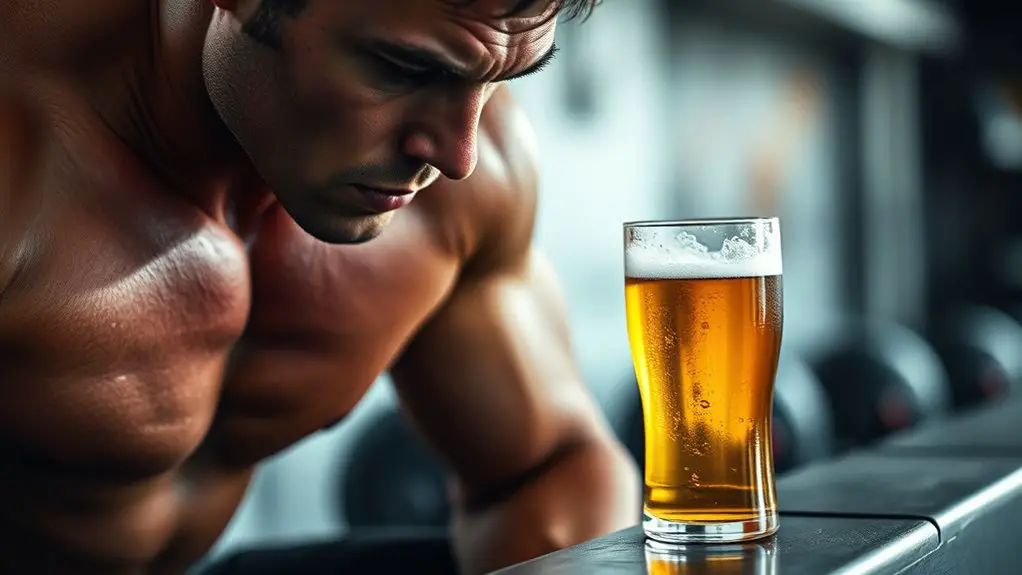
Alcohol can greatly impair your gym performance. It dehydrates you, slows muscle recovery, and reduces strength and endurance. Your body struggles to absorb essential nutrients, leaving you fatigued during workouts. It also disrupts sleep, making recovery longer and more difficult. Plus, alcohol can affect your motivation and mental focus. By understanding these effects, you can make smarter choices that support your fitness goals. There’s more to learn about how to optimize your performance despite alcohol’s impact.
The Science of Alcohol Metabolism
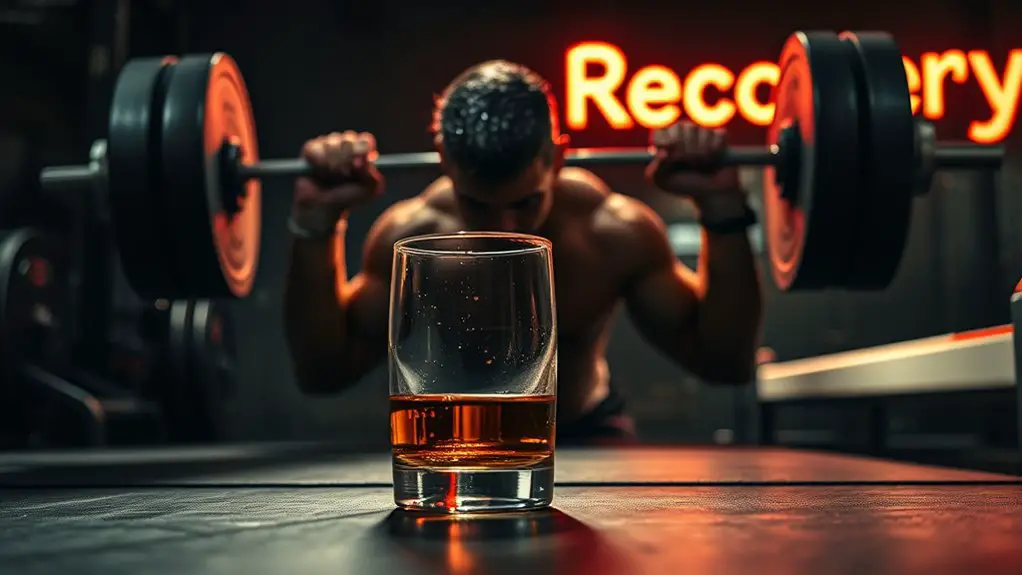
When you drink alcohol, your body goes through a complex process to break it down. This process, known as alcohol metabolism, primarily occurs in your liver. Your liver plays an essential role in converting alcohol into less harmful substances, which your body can then eliminate. Enzymes like alcohol dehydrogenase (ADH) help convert alcohol into acetaldehyde, a toxic compound, before it’s further processed into acetic acid and eventually water and carbon dioxide.
However, heavy drinking can overwhelm your liver function, leading to a buildup of acetaldehyde and increasing the risk of liver damage. Understanding how your body metabolizes alcohol is important for making safer choices, especially if you’re focused on your fitness goals. By being mindful of your alcohol intake, you can better support your liver and maintain peak performance in the gym. Remember, moderation is key!
Impact on Hydration Levels
Although you might enjoy a drink after a workout, alcohol can greatly impact your hydration levels. Consuming alcohol can disrupt your hydration balance, as it acts as a diuretic, increasing urine production and leading to dehydration. Even mild dehydration can result in performance decline, making it harder for you to achieve your fitness goals.
When you’re dehydrated, your body struggles to regulate temperature and transport nutrients effectively, both of which are vital during exercise. This can lead to reduced stamina and increased fatigue, ultimately affecting your workout quality.
To maintain peak performance, it’s important to prioritize hydration, especially if you choose to drink. Consider drinking water alongside any alcoholic beverages, and make sure you’re hydrating adequately before and after workouts. Keeping your hydration levels in check will help you perform better and recover faster, ensuring you stay on track with your fitness journey.
Effects on Muscle Recovery

When you drink alcohol, it can seriously hinder your muscle recovery. You’ll find that impaired protein synthesis and dehydration can lead to muscle cramps, while increased inflammation levels only make things worse. Understanding these effects is essential for anyone looking to optimize their workouts and recovery.
Impaired Protein Synthesis
Alcohol consumption can greatly impair protein synthesis, which is essential for muscle recovery and growth. When you drink, your body experiences increased protein degradation, hindering the ability to build and repair muscle tissue effectively. This disruption can stall muscle hypertrophy, the process that helps you gain strength and size. If you’re serious about your fitness goals, it’s important to reflect on how alcohol impacts your workouts. Even moderate drinking can lead to setbacks in recovery, making it harder for you to bounce back after intense sessions. Prioritizing proper nutrition and hydration is critical, especially if you want to optimize your muscle recovery and overall performance. Keep in mind that every choice you make affects your progress in the gym.
Dehydration and Muscle Cramps
Impairments in protein synthesis aren’t the only way alcohol can affect your gym performance; dehydration is another significant concern. When you drink, your body loses fluids, increasing the risk of dehydration symptoms like fatigue, dizziness, and muscle cramps. These symptoms can hinder your workout and delay recovery. To prioritize muscle cramp prevention, it’s essential to stay hydrated, especially after consuming alcohol. Make sure to replenish lost fluids with water or electrolyte drinks to maintain peak performance. Additionally, listen to your body—if you start feeling the signs of dehydration, take a break and hydrate. Remember, keeping yourself well-hydrated is key to achieving your fitness goals and ensuring a safe gym experience.
Increased Inflammation Levels
While you might enjoy a drink after a workout, it can lead to increased inflammation levels that negatively impact muscle recovery. Alcohol consumption raises inflammation markers in your body, which can hinder your immune response. This means your muscles might not repair themselves as efficiently, prolonging soreness and increasing recovery time. Elevated inflammation can also make you more susceptible to injuries, further complicating your fitness goals. If you’re serious about your performance, it’s essential to reflect on how alcohol affects your body’s ability to recover. Opting for hydration and nutritious snacks post-workout can support your immune system and help reduce inflammation. Remember, prioritizing recovery is key to achieving long-term success in the gym.
Influence on Strength and Endurance
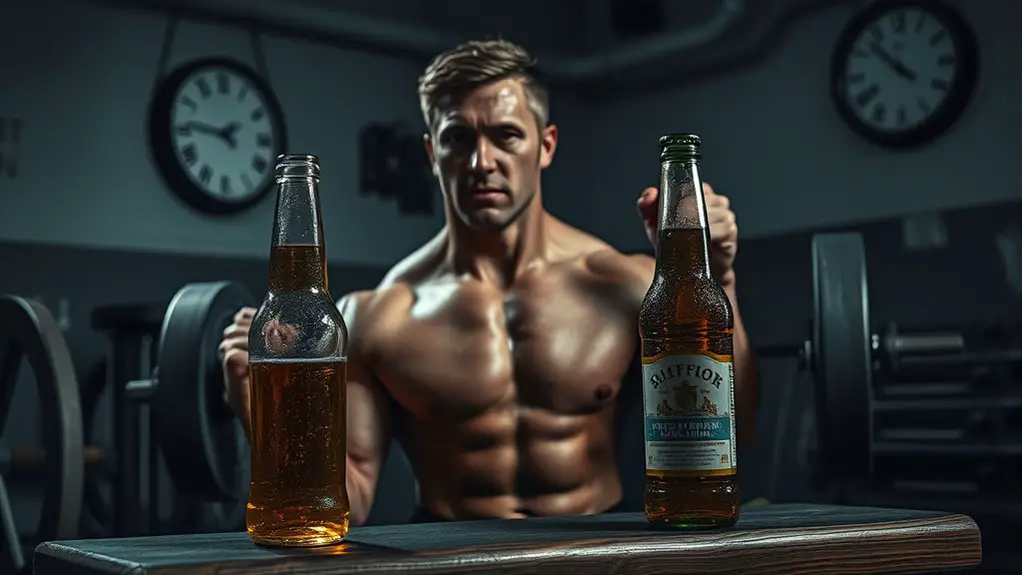
When you hit the gym, the last thing you want is anything hindering your strength and endurance. Alcohol can have a significant impact on both, making it harder for you to achieve your fitness goals. Here’s how it can affect your performance in strength training and endurance sports:
- Decreased Muscle Recovery: Alcohol can slow down the healing process, leaving you feeling sore longer.
- Reduced Strength Gains: Chronic consumption may lead to lower power output during workouts.
- Impaired Endurance: Alcohol can negatively affect your stamina, making those long runs feel even tougher.
- Increased Risk of Injury: Coordination and balance can suffer, increasing the likelihood of accidents in the gym.
To maximize your strength and endurance, it’s wise to think twice before reaching for that drink. Prioritizing your health will help you stay on track with your fitness journey.
Alcohol and Nutrient Absorption
Alcohol can hinder your body’s ability to absorb essential nutrients, which is essential for peak gym performance and overall health. When you consume alcohol, it can create nutrient competition in your gut, making it harder for your body to absorb vitamins and minerals. This competition is particularly concerning for nutrients like B vitamins, magnesium, and zinc, which are important for energy production and muscle recovery.
Additionally, alcohol can reduce absorption efficiency in your digestive system. This means that even if you’re eating a balanced diet, your body might not be getting the nutrients it needs to perform well in the gym. The longer alcohol stays in your system, the more it can disrupt your nutrient intake, leaving you feeling fatigued and less capable during workouts. To maximize your performance and health, consider limiting alcohol consumption, especially when you’re focusing on your fitness goals.
Relationship Between Alcohol and Sleep Quality
When you consume alcohol, it can disrupt your sleep cycles, making it harder to achieve deep, restorative sleep. This disruption not only affects how rested you feel but can also slow down your recovery time after workouts. Understanding these effects is vital if you want to optimize your gym performance.
Sleep Disruption Mechanisms
While you might think a drink or two could help you unwind after a workout, it can actually disrupt your sleep quality in several ways. Alcohol affects your sleep cycles and can lead to hormonal fluctuations that hinder restorative sleep. Here are some key mechanisms at play:
- Reduced REM Sleep: Alcohol can decrease the duration of REM sleep, essential for cognitive recovery.
- Frequent Awakenings: You may find yourself waking up more often during the night.
- Altered Sleep Architecture: Alcohol can disrupt the natural progression of sleep stages.
- Dehydration: It can lead to dehydration, causing discomfort and restlessness.
Maintaining good sleep quality is critical for your overall performance and recovery, so be mindful of your drinking habits!
Impact on Recovery Time
Sleep quality plays an essential role in recovery time, and since alcohol can greatly impair your rest, it can lead to longer recovery periods. When you drink, it disrupts your sleep cycles, preventing your body from fully repairing itself after workouts. This means you might not recover effectively, which can hinder your performance in the gym.
To optimize your recovery strategies, it’s important to minimize alcohol consumption, especially close to your workout days. Coupling good sleep with proper post workout nutrition can enhance your recovery. Focus on nutrient-rich meals and hydration to support muscle repair. By prioritizing your sleep and nutrition, you’ll make sure your body is ready for the demands of your next workout, keeping you safe and performing at your best.
Psychological Effects of Alcohol on Motivation
Although many people enjoy a drink to unwind, alcohol can greatly dampen your motivation to hit the gym. When you indulge, you might experience a motivation decline that makes it harder to stick to your fitness goals. Alcohol cravings can also lead to poor decision-making, steering you away from your workout routine.
Here are some psychological effects you might face after drinking:
- Reduced energy levels: You may feel lethargic and less inclined to exercise.
- Increased anxiety: This can create a mental barrier, making it tough to get motivated.
- Lower self-discipline: Alcohol may weaken your resolve to stick to a workout schedule.
- Negative self-talk: You might find yourself doubting your abilities, further diminishing motivation.
Being aware of these effects can help you make safer choices that support your fitness journey. Prioritize your motivation and health over that next drink!
Long-Term Consequences of Regular Alcohol Consumption
Regularly consuming alcohol can lead to significant long-term consequences that extend beyond immediate effects on your gym performance. Over time, you may face serious long-term health issues, including liver damage, cardiovascular problems, and weakened immune function. These conditions can hinder your ability to train effectively and recover after workouts, ultimately stunting your fitness progress.
Moreover, the addiction potential of alcohol is a concern. What might start as casual drinking can escalate, making it harder for you to maintain a healthy lifestyle. Alcohol can disrupt your sleep patterns, leading to fatigue and decreased motivation in the gym. You’ll find it increasingly challenging to stay committed to your fitness goals.
In the long run, prioritizing your health and well-being is essential. Understanding these consequences can help you make better choices, ensuring you stay on track with your fitness journey. Remember, moderation is key for both your performance and overall health.
Making Informed Choices: Moderation and Timing
While enjoying a drink can be a part of social life, making informed choices about alcohol consumption is essential for maintaining gym performance. To guarantee you’re not compromising your fitness goals, consider these moderation strategies and timing considerations:
- Limit intake: Stick to one or two drinks to minimize effects on your workout.
- Choose wisely: Opt for lighter beverages, like wine or light beer, rather than sugary cocktails.
- Plan ahead: Schedule your drinking on rest days or after workouts to reduce the impact on performance.
- Hydrate: Drink water alongside alcohol to help mitigate dehydration and its effects.
Frequently Asked Questions
Can Alcohol Affect My Workout Performance on the Same Day?
Yes, alcohol can definitely affect your workout performance on the same day. It can lead to dehydration, which impacts your hydration levels and overall stamina. When you’re dehydrated, you may experience energy depletion, making it harder to push through your workout. Additionally, alcohol can impair your coordination and focus, increasing the risk of injury. If you’re planning to exercise, it’s best to limit alcohol consumption beforehand to guarantee a safe and effective workout.
How Does Alcohol Impact My Weight Loss Goals?
When it comes to weight loss, you’ve gotta know that every little bit counts. Alcohol can throw a wrench in your caloric intake, leading to extra empty calories that don’t help your goals. It may also slow your metabolic rate, making it harder to shed those pounds. If you’re serious about your weight loss journey, it’s wise to keep your alcohol consumption in check for better results and overall safety.
Is There a Safe Amount of Alcohol to Consume Post-Workout?
When considering a safe amount of alcohol to consume post-workout, moderation guidelines suggest limiting intake to one drink for men and up to one drink for women. This helps you avoid excessive recovery time and guarantees your body can focus on healing and rebuilding. Remember, staying hydrated and prioritizing nutrient-rich foods is essential for peak recovery, so if you do decide to indulge, balance it with healthy choices to support your fitness goals.
How Does Alcohol Consumption Affect Muscle Building?
Imagine pouring water on a fire; that’s what alcohol can do to your muscle-building efforts. While you’re dreaming of those gains, alcohol can interfere with muscle recovery and protein synthesis. It slows down the process your body needs to rebuild and grow stronger. So, if you’re aiming for those impressive muscles, it’s best to tread lightly with alcohol. Your body deserves the best support to turn hard work into results, doesn’t it?
Can Alcohol Cause Injuries During Workouts?
Yes, alcohol can increase your injury risk during workouts. When you’ve consumed alcohol, your coordination impairment can lead to poor balance and decision-making. This makes it easier to misjudge your movements or overestimate your abilities, which could result in accidents or falls. To keep yourself safe while working out, it’s best to avoid alcohol before hitting the gym. Prioritizing your safety guarantees you can reach your fitness goals without unnecessary setbacks.


